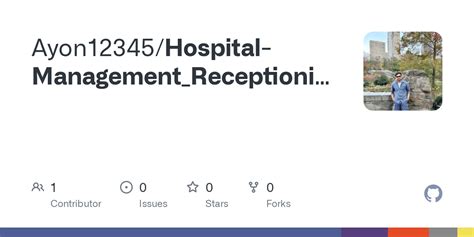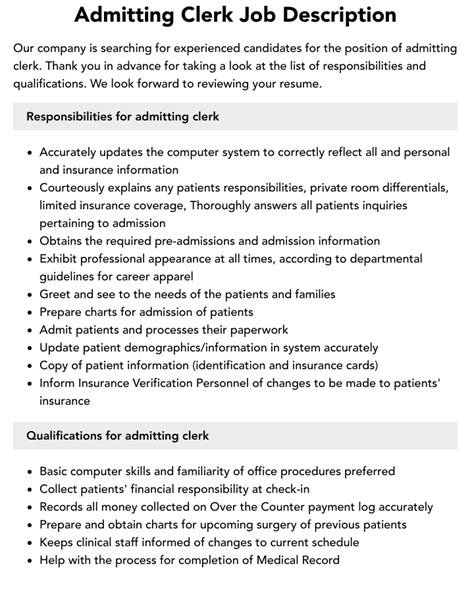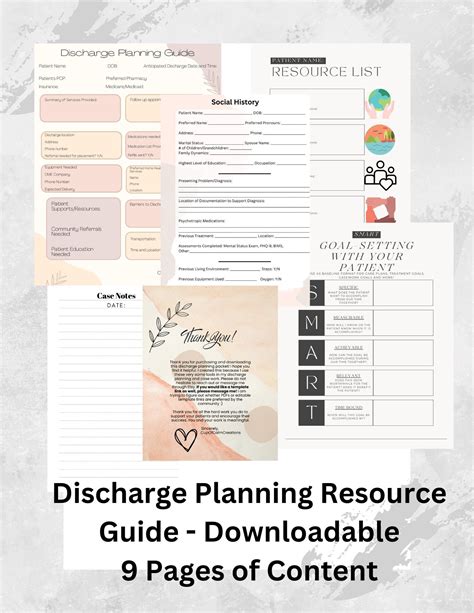Intro
Discover the 5 key front desk positions at hospitals that ensure seamless patient care and administrative efficiency. Learn about the roles of Receptionists, Admitting Clerks, Registration Clerks, Scheduling Coordinators, and Medical Records Clerks, and how they work together to provide exceptional healthcare services, streamline operations, and maintain accurate medical records.
Front desk staff play a vital role in the smooth operation of hospitals, ensuring that patients receive the best possible care from the moment they arrive. The front desk is often the first point of contact for patients, families, and visitors, and it's essential that these staff members are well-trained, efficient, and compassionate. In this article, we'll explore five key front desk positions at hospitals and their responsibilities.

1. Receptionist
The receptionist is often the first person patients and visitors encounter when they arrive at the hospital. Their primary responsibility is to greet patients, families, and visitors, and provide them with any necessary information or assistance. Receptionists are responsible for:
- Answering phone calls and responding to queries
- Checking in patients and verifying their personal and insurance information
- Providing directions and wayfinding assistance to patients and visitors
- Managing the hospital's switchboard and transferring calls to the relevant departments
- Maintaining accurate and up-to-date records of patient information
Skills and Qualifications
- Excellent communication and interpersonal skills
- Ability to work in a fast-paced environment and multitask
- Basic computer skills and knowledge of hospital software systems
- High school diploma or equivalent required; associate's or bachelor's degree preferred

2. Admitting Clerk
The admitting clerk is responsible for ensuring that patients are properly admitted to the hospital and that all necessary paperwork is completed. Their primary responsibilities include:
- Verifying patient information and insurance coverage
- Completing admission paperwork and obtaining necessary signatures
- Ensuring that patients have a valid identification and insurance card
- Scanning and uploading documents to the patient's electronic medical record
- Providing patients with information about hospital policies and procedures
Skills and Qualifications
- Attention to detail and organizational skills
- Ability to work accurately in a fast-paced environment
- Basic computer skills and knowledge of hospital software systems
- High school diploma or equivalent required; associate's or bachelor's degree preferred

3. Registration Clerk
The registration clerk is responsible for registering patients and collecting demographic and insurance information. Their primary responsibilities include:
- Collecting patient information and verifying insurance coverage
- Scanning and uploading documents to the patient's electronic medical record
- Ensuring that patients have a valid identification and insurance card
- Providing patients with information about hospital policies and procedures
- Managing patient flow and ensuring that patients are seen in a timely manner
Skills and Qualifications
- Excellent communication and interpersonal skills
- Ability to work accurately in a fast-paced environment
- Basic computer skills and knowledge of hospital software systems
- High school diploma or equivalent required; associate's or bachelor's degree preferred

4. Discharge Coordinator
The discharge coordinator is responsible for ensuring that patients are properly discharged from the hospital and that all necessary paperwork is completed. Their primary responsibilities include:
- Coordinating patient discharges with nursing staff and physicians
- Completing discharge paperwork and obtaining necessary signatures
- Ensuring that patients have a valid identification and insurance card
- Providing patients with information about follow-up care and appointments
- Scanning and uploading documents to the patient's electronic medical record
Skills and Qualifications
- Attention to detail and organizational skills
- Ability to work accurately in a fast-paced environment
- Basic computer skills and knowledge of hospital software systems
- High school diploma or equivalent required; associate's or bachelor's degree preferred

5. Patient Access Representative
The patient access representative is responsible for ensuring that patients have a positive experience at the hospital. Their primary responsibilities include:
- Providing patients with information about hospital policies and procedures
- Responding to patient complaints and concerns
- Ensuring that patients have a valid identification and insurance card
- Coordinating patient flow and ensuring that patients are seen in a timely manner
- Providing patients with information about follow-up care and appointments
Skills and Qualifications
- Excellent communication and interpersonal skills
- Ability to work accurately in a fast-paced environment
- Basic computer skills and knowledge of hospital software systems
- High school diploma or equivalent required; associate's or bachelor's degree preferred

We hope this article has provided valuable insights into the key front desk positions at hospitals. These staff members play a vital role in ensuring that patients receive the best possible care, and their skills and qualifications are essential to the smooth operation of the hospital.
Now it's your turn! If you have any questions or comments about front desk positions at hospitals, please share them with us in the comments section below. We'd love to hear from you and start a conversation about this important topic.
What is the primary responsibility of a receptionist at a hospital?
+The primary responsibility of a receptionist at a hospital is to greet patients, families, and visitors, and provide them with any necessary information or assistance.
What is the difference between an admitting clerk and a registration clerk?
+An admitting clerk is responsible for ensuring that patients are properly admitted to the hospital, while a registration clerk is responsible for registering patients and collecting demographic and insurance information.
What skills and qualifications are required for a patient access representative?
+A patient access representative requires excellent communication and interpersonal skills, ability to work accurately in a fast-paced environment, basic computer skills, and knowledge of hospital software systems.
